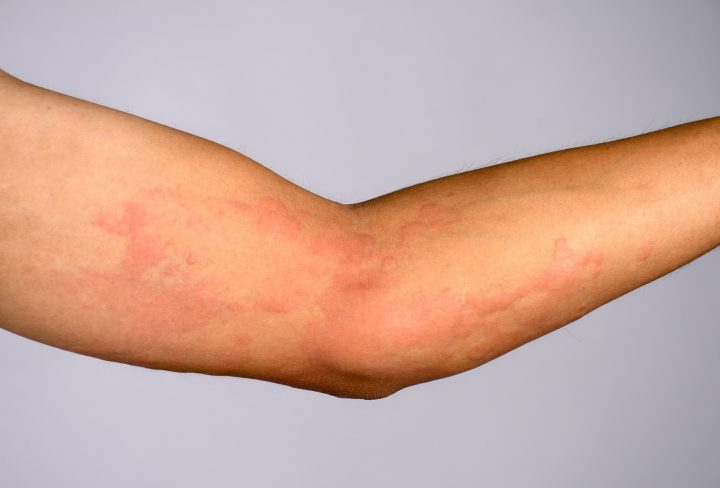- Hives or Urticaria are itchy bumps and raised patches on the body, either red or skin-colored.
- Hives are due to an allergic reaction triggered by many factors.
- Most hives are intensely itchy.
- Mild hives will go away within a few hours or one day.
- See medical care if hives continue to appear for six weeks or longer (chronic hives).
Talk to your doctor to understand more about hives.
Symptoms Of Hives
- Batches of welts (wheals) can arise anywhere on the body
- Welts or bumps that might be red, purple or skin-colored
- Bumps that vary in size and shape and appear and fade repeatedly
- Itchiness which can be intense
- Painful swelling around the eyes, cheeks, or lips
- Flares
If you have trouble breathing or notice any swelling in your mouth or throat, seek emergency medical care.
Triggers (Causes) of Hives
- Food
- Medications
- Insect stings or bites
- Physical stimuli
- Latex
- Blood transfusions
- Infections
- Pet dander
- Pollen
- Some plants
- Radiation therapy
How Are Hives Treated?
- Antihistamines (medicines) provide relief from symptoms of hives
- Chronic hives are treated with antihistamines or a combination of medications.
- Oral steroids are prescribed if antihistamines are not effective.
- A biologic drug is also approved and available to treat chronic hives.
Your doctor might suggest an injection (epinephrine or a cortisone medication) for severe hives.
Preventive Measures of Hives
- Avoid triggers
- Use a nonprescription anti-itch drug
- Apply cold compress
- Take a comfortably cool shower or bath
- Apply an anti-itch cream or lotion
- Wear loose, smooth-textured cotton clothing
- Protect your skin from the sun
- Track your symptoms
Talk to your doctor to know more about the preventive measures for hives
When Should I Call the Doctor About Hives?
- Dizziness
- Wheezing
- Difficulty breathing
- Tightness in the chest
- Swelling of the tongue, lips, or face
Seek emergency care if you notice any of the above symptoms
Frequently Asked Questions On Hives
Are Hives Contagious?
Hives are not contagious. However, if the trigger is an underlying infection, that could be contagious.


